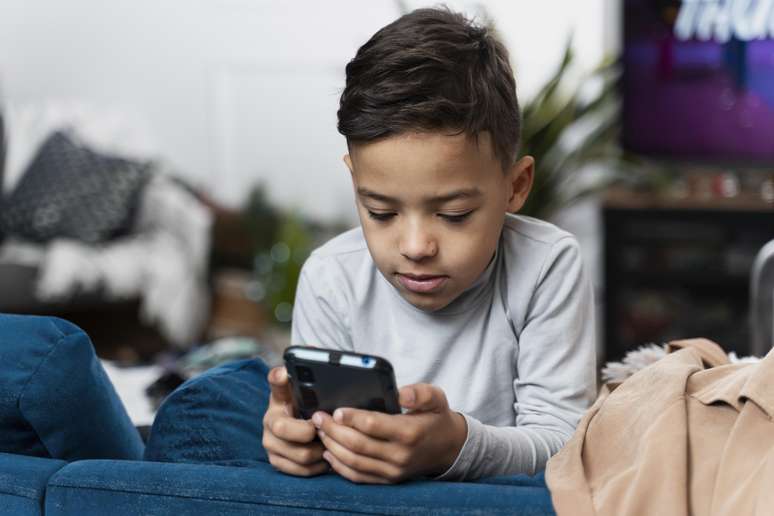Psychiatrist explains how excessive screen time can damage the development of children and adolescents
The digital age where mobile devices have become an extension of our lives, especially for children and adolescents, can bring negative consequences when cell phone use becomes excessive in the lives of young people. Cell phone addiction can impact psychological well-being, bringing with it a series of emotional and behavioral problems.
In an interview with Earth you, the psychiatrist Cynthia Braga explains that too much time spent in front of the screen can contribute to the development of attention and hyperactivity problems.
Children who spend a lot of time in front of screens may have difficulty staying focused on tasks that are not immediately stimulating, which can negatively impact their academic performance and learning abilities.
“Furthermore, sleep can be directly affected, as well as the ability to develop social skills and a greater tendency to be sedentary,” says the psychiatrist.
Excessive screen time can also reduce opportunities for in-person analog social interaction and interpersonal skill development. A lack of real social interaction can lead to increased feelings of loneliness and isolation and harm a child’s ability to develop empathy and essential social skills.
The professional emphasizes that parents must be careful to identify the signs that can manifest themselves in different areas of the child’s life and that can indicate the need to review the habits of using technology.
“Exposure to screens, especially before bedtime, can interfere with circadian rhythm and sleep quality and may be associated with increased difficulty regulating emotions and increased anxiety or depression,” explains the expert.
Social isolation
The professional recommends determining whether the child prefers screens to social activities, such as playing with friends, participating in extracurricular activities, or spending time with family. If the answer is yes, it is time to rethink the exposure to screens allowed.
Physical symptoms
It is also important to pay attention to physical complaints such as frequent headaches, vision problems, or neck and back pain. These symptoms can be the result of poor posture and prolonged time in front of screens.
Aggressive or impulsive behaviors
The use of violent or aggressive content on screens can affect a child’s behavior. If you notice an increase in aggression or impulsive behavior, it could be a reflection of the content consumed or prolonged exposure.
Lack of interest in previous activities
If your child shows disinterest or lack of motivation in activities they previously enjoyed, this could be a sign that excessive screen time is replacing other forms of engagement and pleasure.
“It is essential that parents be alert to these signs and consider implementing limits on screen time, as well as promoting alternative, healthy activities. Talking openly with your child about technology use and creating a balanced, enriching environment can help mitigate these effects and promote healthy development,” says the expert.
Screen time
Regarding the current recommendation on screen time for children of different age groups, the psychiatrist notes that it varies by age and emphasizes the importance of balancing screen time with other activities that are essential for healthy development.
For children from 0 to 2 years: “The ideal is to avoid it!”
Children aged 2 to 5 years: “For this age group, it is recommended to limit screen time to a maximum of 1 hour per day dedicated to high-quality activities. This includes educational and interactive content that can be watched together with parents. It is important that screen time does not replace physical activity and play.”
Children aged 6 to 12: “The recommendation is that screen time should not exceed 2 hours per day, including time spent in school and recreational activities. Parents should monitor content, ensuring it is age-appropriate and promotes learning and creativity. It is essential that screen time is balanced with other activities, such as sports, reading and social interaction.”
Teens (13 to 18 years old): “For adolescents, the recommendations are more flexible, but still suggest the importance of monitoring screen time and promoting a healthy balance. The focus should be on the quality of content and the impact on overall well-being, including sleep, physical activity, and social life. Parents should be aware of excessive use and the potential impact on mental and emotional health.”
Interventions
Set clear boundaries
Set daily and weekly screen time rules. Use parental control tools and settings to monitor and limit screen time.
Promote alternative activities
Encourage non-screen activities such as reading, outdoor play, sports, and creative hobbies. This helps ensure that children engage in a variety of experiences.
Be a positive role model
Demonstrate healthy technology habits. Children tend to imitate their parents’ behavior, so it’s important for adults to practice healthy screen use, too.
Create rules for using screens
Establish rules for screen time at home, such as not using devices during meals or before bed, or only allowing screen time after tasks are completed. This helps you create a routine that prioritizes quality family time and adequate sleep.
Get actively involved
When possible, engage in screen time with your children. This allows you to monitor the content and take the opportunity to discuss what they are seeing and learning.
Source: Terra
Ben Stock is a lifestyle journalist and author at Gossipify. He writes about topics such as health, wellness, travel, food and home decor. He provides practical advice and inspiration to improve well-being, keeps readers up to date with latest lifestyle news and trends, known for his engaging writing style, in-depth analysis and unique perspectives.






-1je9vy4473ho3.jpg)


